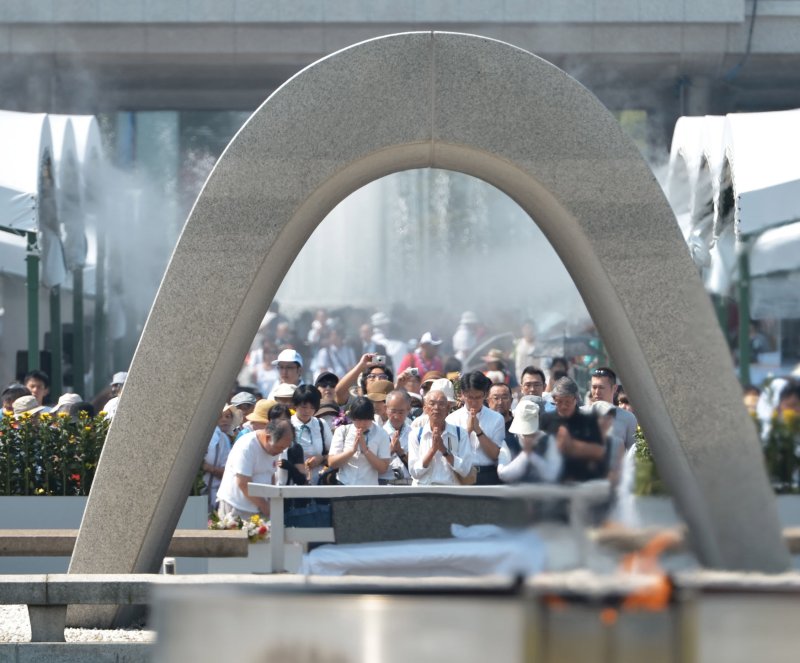People pray for the atomic bomb victims at Hiroshima Peace Memorial Park marking the 70th anniversary of the atomic bombing in Hiroshima, Japan, on August 6, 2015. File Photo by Keizo Mori/UPI |
License Photo
WASHINGTON, May 26 (UPI) -- This Friday President Barack Obama will visit Hiroshima in Japan. Many Americans are concerned that he will apologize for the World War II bombing of that city with an atomic bomb — an action they believe was necessary and justified. Many other Americans are hoping that he will apologize and wipe away what they see as a stain on our national conscience.
But the meaning of Obama's visit is larger than the guilt or innocence of the United States. Hiroshima and Nagasaki, after all, symbolize what nuclear weapons can do. They are reminders of the power and destructiveness of the weapons. Those two cities will forever be synonymous with tragedy, pain, and fear. But rather than focusing on whether the United States acted rightly or wrongly, the visit of the president of United States in Hiroshima is a unique moment to reflect on the larger meaning of nuclear weapons.
What will go through Obama's mind during the minute of silence that will be observed? What will he conclude after seeing the museum, the photos and bits and pieces of the wreckage of the city — knowing that someone a few meters away has the nuclear "football" — the briefcase that holds the command codes to launch U.S. nuclear weapons? Will he think about his daughters? Will he think about the famous picture of a Japanese woman wounded by heat, where the skin has been melted?
The bombing of Hiroshima and Nagasaki established nuclear weapons as the currency of power in the 20th century. They were the weapons a nation needed to be respected and to keep itself safe. But with the arrival of the 21st century, some of those old truths have fallen away.
Historians now doubt whether nuclear weapons forced Japan to surrender, pointing out that the Soviet Union declared war on the same day that Nagasaki was bombed. What if nuclear weapons are not as intimidating as we have always imagined?
Nuclear deterrence was a mainstay of the Cold War, but now it seems clear that it will inevitably fail one day. The problem is not the weapons. The problem is the fallibility of human beings. After all, nuclear deterrence is not a machine that runs quietly by itself in the corner. We make the threats, we evaluate them, we decide how to respond. We're involved at every step in nuclear deterrence. If human beings are prone to folly — and we are, and if human beings are involved in nuclear deterrence — and we are, then nuclear deterrence is inherently fallible: It will fail one day. This is just human nature and common sense. How can we continue to rely on a process that will inevitably fail with catastrophic consequences? A nuclear war would kill something like 400 million people and leave civilization devastated for centuries.
Yet despite the fact that we now see the dangers and unreliability of nuclear weapons more clearly than we did during the Cold War, nuclear-armed states are not scaling back their dependence on these weapons — they're increasing their reliance on them. The world has quietly embarked on a new nuclear arms race. Russia is rearming, the United States is planning to spend a trillion dollars on upgrading its nuclear weapons, and China is expanding its previously tiny arsenal. The prime minister of France explicitly said that a new arms race was underway when he inaugurated France's new Laser Megajoule: "Now France is leading the race for deterrence technology." We haven't learned the lessons of the Cold war, apparently.
Nuclear weapons are the Maginot Line of the 21st century. This famous French fortification system, built at enormous cost between 1928 and 1940, was expensive, impressive, a symbol of national security, and ultimately ineffective. It didn't prevent of the Nazi invasion. Nuclear weapons are often held up as symbols of national greatness, but the problem with symbols is that people sometimes fall in love with the symbol and forget to be sure that the weapon system itself is really useful. Nuclear deterrence doesn't engage with the security challenges most states face in this century: terrorism, cyberwar and climate change.
Obama and President Francois Hollande of France say they want a world without nuclear weapons. But Obama has increased spending on nuclear weapons and Hollande has said that, "Deterrence is what ensures we can live in freedom."
Nuclear weapons are clumsy, dangerous weapons, nuclear deterrence is too unreliable to depend on over the long run and to use nuclear weapons would be immoral. It may be difficult finding a careful and secure method of backing away from the current mess — ensuring that all of the world's nations get rid of their nuclear weapons together, but let us begin.
{i:Ward Wilson is director of the Rethinking Nuclear Weapons project of BASIC (the British American
Security Information Counsel). Jean-Marie Collin is director of parliamentarians for Non-proliferation and Nuclear Disarmament for France and Francophone countries and vice president of Initiatives for Nuclear Disarmament.}















